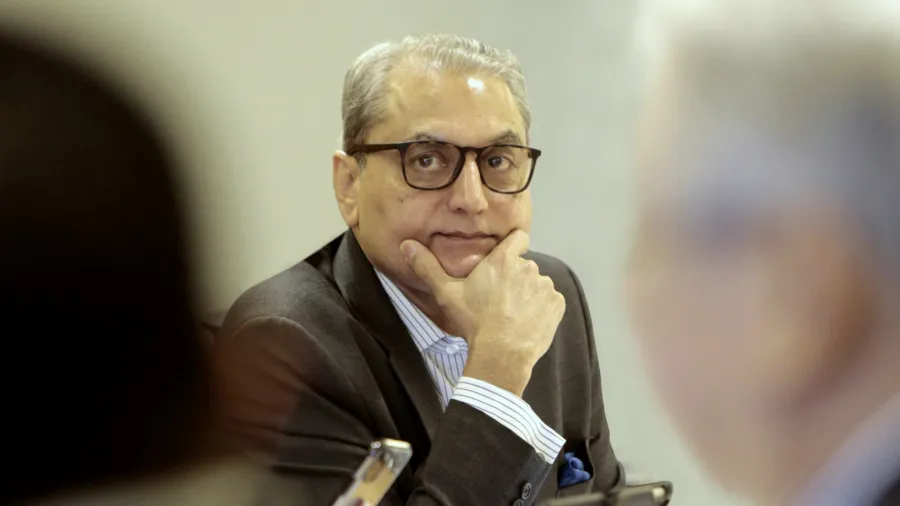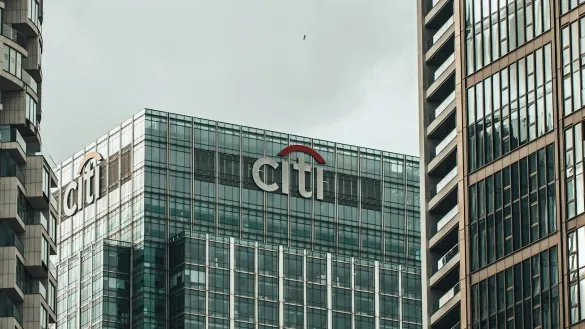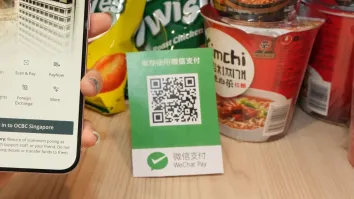
Security Bank CEO Sanjiv Vohra on future-proofing a bank amidst a time of upheaval
The CEO of Philippines’ first private bank post-war highlights the importance of a people-centric approach in future-proofing a bank whilst tackling a crisis.
For Security Bank CEO Sanjiv Vohra, the key to thriving in the future is not just in digitisation and realignment of long-term goals: it’s in offering a customer-centric banking journey and putting people at the center of their operations.
“Our goal is to become the most customer-centric bank in the Philippines and that in itself is a big statement,” Vohra told Asian Banking & Finance in an exclusive interview. “In more quantitative terms, our goal is to be the industry leader amongst our chosen customer segments measured by net promoter score (NPS).”
Celebrating its 70th year anniversary this June, Security Bank entered a new decade characterized by a world fraught with massive upheavals. The coronavirus pandemic has altered the future of the banking industry—especially in the Philippines, where even the physically-reliant customers shifted to banking digitally during the three-month long lockdown and amidst ongoing social distancing restrictions.
Vohra is unfazed by these changes. Having been in the banking and finance industry for over 3 decades, he has witnessed two downturns prior to the past year--the 1997 Asian Financial Crisis, and the global recession of 2009.
“Through all these events, the importance of positive relationships in the workplace cannot be underestimated,” Vohra said, adding that a service-oriented business like banking is all about relationships.
“To nurture positive interactions means creating an avenue for open and transparent communication at all times. Honesty in communication breeds trust, and trust allows us to earn respect and loyalty over time. When we respect and trust the people we work with, we develop an increased capacity to thrive, innovate, mentally flourish and actively address challenges head on,” he added.
The focus on long-term client relationships and communication is reflected in Security Bank’s BetterBanking brand promise, which Vohra said is nurtured through three things: humility, empathy and mutual respect.
What lessons have you learned since stepping up as head of Security Bank?
First is the value of communication. I’ve learned that no matter how long you have been in the industry, the critical role that communication plays never changes.
Second is the importance of having the same shared goals and vision with the people you work with.
Third is valuing each other’s time. It’s critical that every interaction is built on a win-win paradigm and adds value for all the parties involved.
It’s a privilege for me to lead an organization with a 70-year history in banking. Last year was a test of our resilience and nimbleness. The Taal Volcano erupted in January, the COVID-19 pandemic hit a month after and back to back typhoons ravaged some parts of the country by yearend.
Accepting new realities and balancing that with a belief that we would come out stronger are vital. I’m grateful of our ability to anticipate the worst-case scenarios, which allowed us to adjust our strategies quickly, prepare for a wide range of possibilities, and become better prepared to pivot gracefully amid the disruptions.
There are so many lessons to share since I stepped up as head of Security Bank in 2019. If I had to choose the most important one, it would have to be leading by putting people first. The people-first policy of the Bank goes beyond employee contracts. Employees are treated like family members. There is genuine concern to look after each other and protect each other especially in a time of crisis.
How has the pandemic changed banking not just in the country but across Asia?
The pandemic has affected the banking industry in many ways. These include reduced profits due to increased credit provisions which in turn increased the buffers (or allowances) for NPLs to protect banks’ capital, as well as tightened risk acceptance standards to ensure that banks remain resilient throughout the crisis.
But it is important to keep in mind that the pandemic has also forced us to rethink how we’ll be able to continue and sustain banking processes given physical constraints and protocols while maintaining the integrity of the process.
It seems that this is true not just for us in the Philippines but for regional banking as well. One important thing that we realized is that it is possible and doable if we give people the right tools and the correct direction.
While there is a learning curve attached with that, one thing that we realized was that banking in general was pointing towards this all along and the pandemic just accelerated the process.
How has COVID changed the way Filipinos and local businesses bank?
COVID-19 has changed the mindset of Filipinos and local businesses when it comes to banking. Digitalization of banking services became even more important.
The pandemic allowed Cash Management Systems like Security Bank DigiBanker to gain momentum as businesses were forced to operate remotely to prevent the spread of the COVID-19 virus. Cash management used to be more of a value-added service but today it has become a critical core business of banks.
The rise of banking from home has been proven by the uptick in online transactions seen at Security Bank. Year-on-Year growth in the usage of Security Bank Online was at 59% with enrolment increasing by 39% in 2020.
Online money transfer also posted a significant increase in 2020, as compared to 2019. EGiveCash, Security Bank’s domestic remittance service, grew by 284% while Fund Transfer transactions grew by 51%.
And how has the Security Bank overcome these challenges?
Our immediate response was to ensure the safety of our people, our customers and our communities while making Security Bank more agile and resilient. Prior to the implementation of the ECQ, we activated our Business Continuity Plan by rolling out split operations arrangements. When the lockdown was imposed, work-from home was in effect.
For our clients, we made adjustments to our products and services, waived ATM withdrawal and money transfer fees to allow customers to access their funds whenever and wherever is most convenient for them and implemented a 30-day extension on loan payments even before the passing of both Bayanihan to Heal as One Act and Bayanihan to Recover as One Act.
With Filipinos staying at home, we had to make sure that we have the capability to cater to their banking needs. In order to keep up with the increasing demands for online banking, we continue to rollout upgrades and enhancements on our digital banking platforms to improve our clients’ overall banking experience.
In order to keep up with the increasing demands for online banking, we continue to rollout upgrades and enhancements on our digital banking platforms to improve our clients’ overall banking experience.
We also recognized that competitive advantage is no longer confined to just product, sales and service differentiation but from capabilities that are aligned with how our customers want to interact with us and how they can interact in a simple and accessible manner.
What do you think the Philippine banking scene needs to upgrade or to invest in the coming years?
I think it is important that the banking scene gets comfortable with the digital space. The pandemic has accelerated the shifting trend towards online banking as a more preferred channel for doing transactions, may it be on the retail or commercial side.
This trend holds true as well for the investment and trading space and even instant client interactions. I think the biggest gap would be to promote buy-in to a wider client base.
The government has been instrumental in promoting digital banking through the implementation of key projects that enable digitalization. This includes the roll out of PhilSys or the Philippine Identification System that hopes to give Filipinos a single identification card that will serve as the primary ID to be used for all transactions. Once all of the phases of the National Retail Payment System are completed, having cash in your wallet will become a thing of the past and these new technologies will become your new wallet.
The advent of digital banking globally will help bridge the gap between the banked and unbanked Filipinos. Many will be more open to try and experience new banking modalities which in return will help the economy get back on its feet.
Through the e-commerce act of 2002, digital banking will continue to thrive as the need for wet signatures will decrease. The availability of an online holistic credit bureau will also help banks gain access to data, which can allow them to create digital products tailor-fit to the needs of the consumer.
The Bangko Sentral ng Pilipinas has published a digital banking framework recently. What is your view on the entrance of digital-only banks in the near-future?
The advent of digital banking will go after the easiest of products provisioned through a digital platform. Will this be competition for the banking industry? The short answer is yes and to that end, the banking industry needs to ensure that it is meeting the changing demands of the customers.
While the focus is on digital, it is important to know that the product capability will be centered only through digital channels and so these new entrants to the market need to provide the totality of the vertical capability.
Our focus at Security Bank will be on understanding the needs of our customer in product and service and invest in providing a holistic solution.
The bank has continually innovated in the past few months, launching a Better Banking On-The-Go initiative and even announcing 7 new branches this year. How do these initiatives align with the bank’s goals?
BetterBanking On-The-Go truly brings BetterBanking to a different level. Through our Bank on Wheels, we have been given the opportunity to fulfill customers’ transactions outside the premises of the branch and still ensure their safety.
Various customers' banking needs such as account opening, bills payment, deposit and withdrawals can be done conveniently using our Bank on Wheels. Payroll clients can also claim their ATM cards, PIN Mailers and checkbooks. A tablet for Security Bank Online transactions is also made available.
We acknowledge that while digital banking has become increasingly preferred since the start of the pandemic, there are still customers who wish to visit branches. We will continue to establish branches in locations that we currently do not have any presence especially to address gaps in our target market.
In what ways is Security Bank future-proofing itself?
The pandemic has changed how we at Security Bank think about future-proofing our organization. We had to re-focus our near-term and long-term goals to ensure that we can continue to thrive in the new normal.
We continue to leverage our financial and balance sheet strengths to pursue opportunities. As to how we will be achieving that will be through four different areas.
The first will be through transformative investments to reshape Security Bank’s digital channels for our Retail, Wholesale and Contact Center. For Retail, our goal is to enable customers to use our digital mobile platforms to conduct transactions that they would normally do in a branch.
We also support our wholesale clients by extending new digital capabilities to the business community, particularly to the SMEs, to support growth through a self-service digital channel.
Our second area of focus will be to refresh our Credit and Collections framework. We have seen over the past months that customers’ ability to maintain their loan or credit repayments have been hampered by the pandemic. We want to be in a strong position to extend support through a very different approach to collections as the impact of the pandemic unfolds on the Bank’s portfolio.
Third is to constantly update our technology stack by focusing on building our capacity and capability for our technology infrastructure, architecture as well as network capacity in order to pre-empt the expected growth and usage in channels once our digital plans are fully rolled out.
And lastly, through SB Finance, the joint venture between Security Bank and Bank of Ayudhya. The two partners have committed three billion pesos in additional capital to innovate personal loans and extend novel financing solutions to the mass market segment.
The capital infusion into SB Finance is an expression of support in the recovery of the Philippine economy. As we anticipate the recovery of the economy, we believe the demand in the consumer finance segment will go up and this additional capital will be used for business expansion as we set to launch multiple products in this space.
Security Bank is celebrating its 70th anniversary this year. What projects or events does the bank have in store to celebrate this milestone?
We are thrilled to be celebrating Security Bank’s 70th anniversary. This year is special because it doesn’t just mark 70 years of BetterBanking service for every Filipino. It also gives us another chance to give back to our customers, shareholders, our fellow Security Bankers and the general public for their support.
Security Bank has always put people at the forefront — by people, we’re talking about our employees, clients and partners. Taking on 2021, we fuel people’s hope by continuing to give back. We’ll use what we’ve learned the past years to guide us as we stay true to our commitment to provide the BetterBanking experience our clients deserve.
We are confident that we are ready to keep working for the welfare of those we serve. You can look forward to new products and services meant to make banking experiences more seamless and systems flexible enough to handle our customers’ ever-changing preferences and needs.
What future goals or plans do you and the bank hope to achieve in the coming years?
A key priority for us at Security Bank is to continuously provide differentiated service that will make our BetterBanking promise even more unique. We continue to strengthen and institutionalize the customer satisfaction framework which was rolled out across the Bank.
The overall results of our studies have given us additional insight on the shift of our customer banking needs, by using the data from our service management platform and bridging that to the sentiments captured from our customer survey, we have identified the thematic and persistent drivers of customer pain points.
To put this into action, process excellence and automation capabilities are being explored and implemented to complement the customer experience and seamlessly deliver our brand promise of BetterBanking to our customers.
Serving our customers has always been integral to our success, but to invest in them means taking it another step forward — thinking long term and looking at the bigger picture. Investing is about focusing on areas with high potential.
We cannot be distracted trying to be all things to all segments. We must have the discipline to stick to our plans, take calculated risks, and avoid complacency. We must push to innovate and delight our core customers by consistently exceeding expectations across product and service.
To succeed, a change in our own mindset is necessary. Rather than focusing on what we can do or what the competition does, we must begin by knowing our customers’ journeys and understanding their pain points.
Our goal is to become the most customer-centric bank in the Philippines and that in itself is a big statement. In more quantitative terms, our goal is to be the industry leader among our chosen customer segments measured by net promoter score (NPS).
We believe this goal represents our desire to serve our customers to the best of the ability and will translate to superior financial growth for the Bank and equate to what it means to be a customer-centric bank.
Industry-wise: what is your view of the Philippine banking industry’s future? Where is it headed?
There is a positive future for Philippine banking since the economy is on a verge of recovery. The challenge now is to restore confidence without sacrificing safety protocols. If this is done right, we can expect for business confidence to respond positively, this means growth in consumption, economic activity, loan growth and business expansions.
The central bank had been instrumental in supporting the banking sector in terms of providing additional liquidity to cushion the adverse effects of the pandemic on financial system.
We have seen positive results from countries such as US, UK and Israel that have reported great efficacy of the vaccine in preventing new COVID cases. Once more countries are able to roll out mass inoculations and prevent new infections, we will see consumer confidence go up gradually. However, recovery will not be the same for everyone. We will see some industries recover faster than others.
Again, as we look ahead, locally we have low-interest rates, sufficient liquidity, pro-active Central Bank, resilient currency and a strong potential for economic and consumption rebound. We have a good fiscal performance and strong external and financial sector positions providing the country with relative stability amid this pandemic.

Sanhiv Vohra, CEO, Security Bank Corporation



















 Advertise
Advertise











